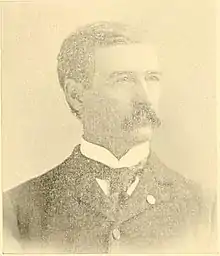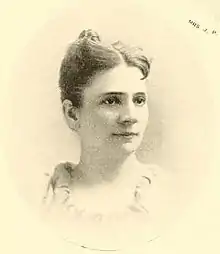Josiah Duane Hicks
Josiah Duane Hicks (August 1, 1844 – May 9, 1923) was a Republican member of the U.S. House of Representatives from Pennsylvania.
Josiah D. Hicks | |
|---|---|
 | |
| Member of the U.S. House of Representatives from Pennsylvania's 20th district | |
| In office March 4, 1893 – March 3, 1899 | |
| Preceded by | Edward Scull |
| Succeeded by | Joseph Earlston Thropp |
| Personal details | |
| Born | August 1, 1844 Machen, Monmouthshire, Wales, U.K. |
| Died | May 9, 1923 (aged 78) Altoona, Pennsylvania, U.S. |
| Political party | Republican |
| Military service | |
| Allegiance | |
| Branch/service | United States Army |
| Rank | Private |
| Battles/wars | American Civil War |
Biography
Josiah D. Hicks was born in Machen, Monmouthshire, Wales. He immigrated to the United States with his parents, who settled in Chester County, Pennsylvania, in 1847, and in the same year moved to Duncansville, Pennsylvania. He attended the common schools of Blair and Huntingdon Counties. He moved to Altoona, Pennsylvania, in 1861.[1]
During the American Civil War, he enlisted in the One Hundred and Twenty-fifth Regiment, Pennsylvania Volunteer Infantry, as a private in 1862 and served nearly eighteen months. He reentered civil life as a clerk on the Pennsylvania Railroad. He studied law, was admitted to the bar in 1875 and commenced practice in Tyrone, Pennsylvania. He was elected district attorney of Blair County in 1880, and reelected in 1883.

He married Josephine Barrick, a native of Frederick county, MD. She descended from the Harbaugh family, so distinguished in Revolutionary times for patriotism and valor. The history of the family is almost coextensive with the history of the country. The Harbaughs settled in Maryland in colonial times and took up an extensive tract in the beautiful region known as the Harbaugh valley. The homestead, which was built in the seventeenth century, still stands near Sabillasville, and is one of the oldest landmarks in the State. At the time of the Centennial Exposition a Baltimore syndicate offered a large sum to be permitted to move it to Philadelphia, but Mrs. Harbaugh, who was an aunt of Mrs. Hicks, was not willing to part with her ancestral home for money. It was built in the old German style of architecture, with very high ceilings, large and spacious rooms and solidly lined in hard wood with massive carvings. It is indeed a wonderful piece of architecture and in fine preservation. She had strong temperance principles and was an active member of the Methodist church, of Altoona.[2]
Hicks was elected as a Republican to the Fifty-third, Fifty-fourth, and Fifty-fifth Congresses. He served as chairman of the United States House Committee on Patents during the Fifty-fifth Congress. He was not a candidate for renomination in 1898. He resumed the practice of law, and served as a member of the Altoona Board of Education from 1911 to 1919. He served as State commander of the Grand Army of the Republic in 1921. He died in Altoona in 1923 and is interred in Fairview Cemetery.[3]
References
- United States Congress. "HICKS, Josiah Duane (id: H000565)". Biographical Directory of the United States Congress.
- Hinman, Ida (1895). The Washington Sketch Book.
- United States Congress. "HICKS, Josiah Duane (id: H000565)". Biographical Directory of the United States Congress.
External links
- United States Congress. "Josiah Duane Hicks (id: H000565)". Biographical Directory of the United States Congress. Retrieved on 2008-02-14
- The Political Graveyard
| U.S. House of Representatives | ||
|---|---|---|
| Preceded by Edward Scull |
Member of the U.S. House of Representatives from Pennsylvania's 20th congressional district 1893–1899 |
Succeeded by Joseph E. Thropp |
